
Ability Media reaches out to tell stories of inclusion, illumination
February 14, 2022

February 14, 2022
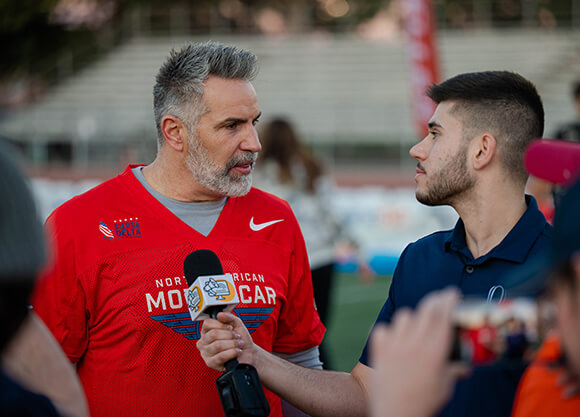
McGuire, a sophomore journalism student in the 3+1 accelerated dual-degree program, covered the innovative Google testing at Quinnipiac’s North Haven Campus in December.
She's one of about a dozen QU students working together to tell stories for Ability Media, a groundbreaking startup created by the School of Communications and Dave Stevens, an Emmy Award-winning broadcaster and professional in residence. This digital news organization was launched in 2020 to address the scarcity of people with different abilities in the news industry and the media’s lack of coverage of people with different abilities.
McGuire understands the need for inclusion in her chosen profession. She’s a skilled journalist who was born with cerebral palsy, a group of disorders that affects a person’s ability to control muscle movement.
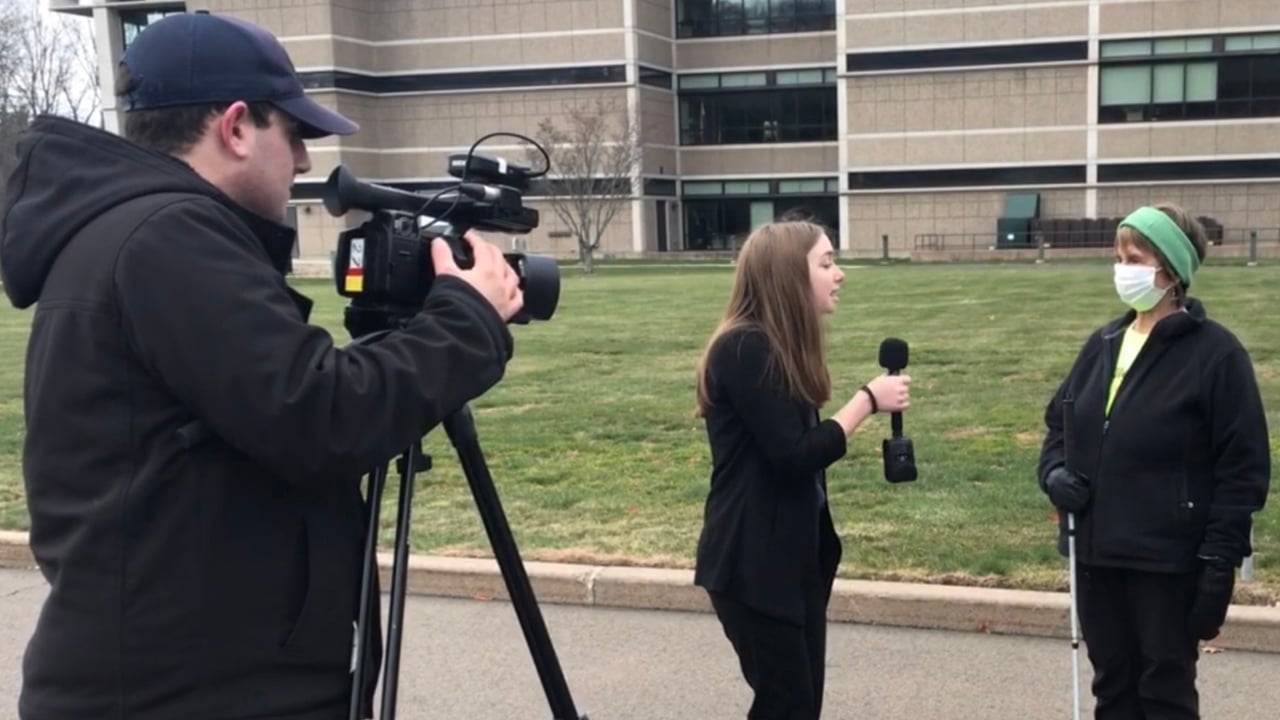
“I have a disability myself. I have CP, so I’m especially interested in that,” said McGuire, who also works as a reporter for Q30 Television and a producer/intern for the Quinnipiac University Podcast Studio. “As a journalism major, Ability Media gives me another outlet to get in front of the camera. But I don’t want to be known as a journalist with CP. I just want to be known as a journalist.”
With each assignment, McGuire proves that cerebral palsy is a diagnosis, not a definition. Her work speaks for itself in a thoughtful, resonant voice.
“With Grace, you just turn her loose and let her go,” said Chris Roush, dean of the School of Communications. “She needs very little handholding in direction. She’s a self-starter, and she will go far in this world.”
McGuire sees a platform for real-world learning at Ability Media — and real-world change.
It’s an interdisciplinary mindset Quinnipiac has thoroughly embraced over the years, from Skiers Unlimited, a program where faculty, students and alumni teach children with disabilities how to ski, to Camp No Limits, an overnight summer camp for children and adolescents with limb loss and their families hosted by the occupational and physical therapy programs.
There are always new ways to connect and engage with other communities. Ability Media is just one of the latest.
“Because Ability Media is so small, you have lots of opportunities to try different things. That’s probably the best part of it,” McGuire said. “I’m a reporter, but I also manage some of the social media. Any experience you can get matters and can help you get better, but what makes Ability Media different is you can also be an advocate for a greater cause.”
Roush sees inclusion as a moral and professional obligation at universities and media companies. Ability Media, with its impactful storytelling, is key to this urgent and game-changing response at Quinnipiac.
“We’re showing that people with disabilities can easily do jobs in media and communications,” Roush said. “The media world needs to pay attention to these people when they’re hiring folks.”
A 2018 study by the Centers for Disease Control and Prevention found that 26% of the U.S. population — 61 million people — live with a disability. That’s 1-in-4, a statistic that comes alive when you walk across the Quad, wait in line at the grocery store or pump your gas on the way home.
Sometimes, these different abilities are visible and discernible. Other times, they’re much less apparent. Last year, about one-half of the Ability Media students had a learning disability or a physical disability.
“The media industry basically ignores this community,” Roush said. “There are no full-time ‘disability reporters’ at the major news organizations in this country. And the movie industry and the TV industry underplay people with disabilities in their movies and TV shows.”
Meanwhile, Ability Media and other advocates are working hard to change this approach.
Lauren Appelbaum is the vice president for communications and entertainment & news media at RespectAbility, a nonprofit dedicated to accurate portrayals of people with disabilities in feature films and TV programs. Appelbaum, who has a nonvisible disability, has worked closely with Amazon, NBCUniversal, Netflix, The Walt Disney Company, ViacomCBS and others over the years.
“Even though the number of disabled characters on screen continues to increase in recent seasons, an estimated 95% of available roles are portrayed by talent without a disability,” Appelbaum said in a joint study by RespectAbility and Nielsen last July.
“When disability is a part of a character’s story, too often content can position disabled people as someone to pity or someone to cure,” she added. “It is crucial we have disabled talent both in front of and behind the camera to develop genuine, multidimensional characters.”
Ultimately, Ability Media was launched to report authentic stories about disabilities — the issues, the opportunities, the struggles, the successes, all of it. Visibility matters, particularly after decades of invisibility.
“We can draw attention to this at Quinnipiac. We can make a difference in the communications world,” Roush said. “We can create a spotlight to show the media world that it needs to address this problem.”
Already, professors at the University of Kansas, Utah State University and Montclair State University in New Jersey have reached out to Roush to learn more about Ability Media. Its inspiring and inclusive model is one Quinnipiac hopes to see replicated across the country.
The School of Communications showcased its inclusive model on a national stage last week in Los Angeles. Six students — three from Ability Media and three from Q30 — covered events, conducted interviews and produced stories leading up to Super Bowl LVI at SoFi Stadium in Inglewood, California.
The student contingent reporting from Los Angeles featured Vanessa Blasi of Dix Hills, New York; Sydney Handler of Hillsborough, New Jersey; Santino Maione of Lynbrook, New York; Ephemia Nicolakis of Woodbridge, Connecticut; Aaron Roberts of Andover, Massachusetts; and Lauryn “Lo” Yarnall of Newbury Park, California.
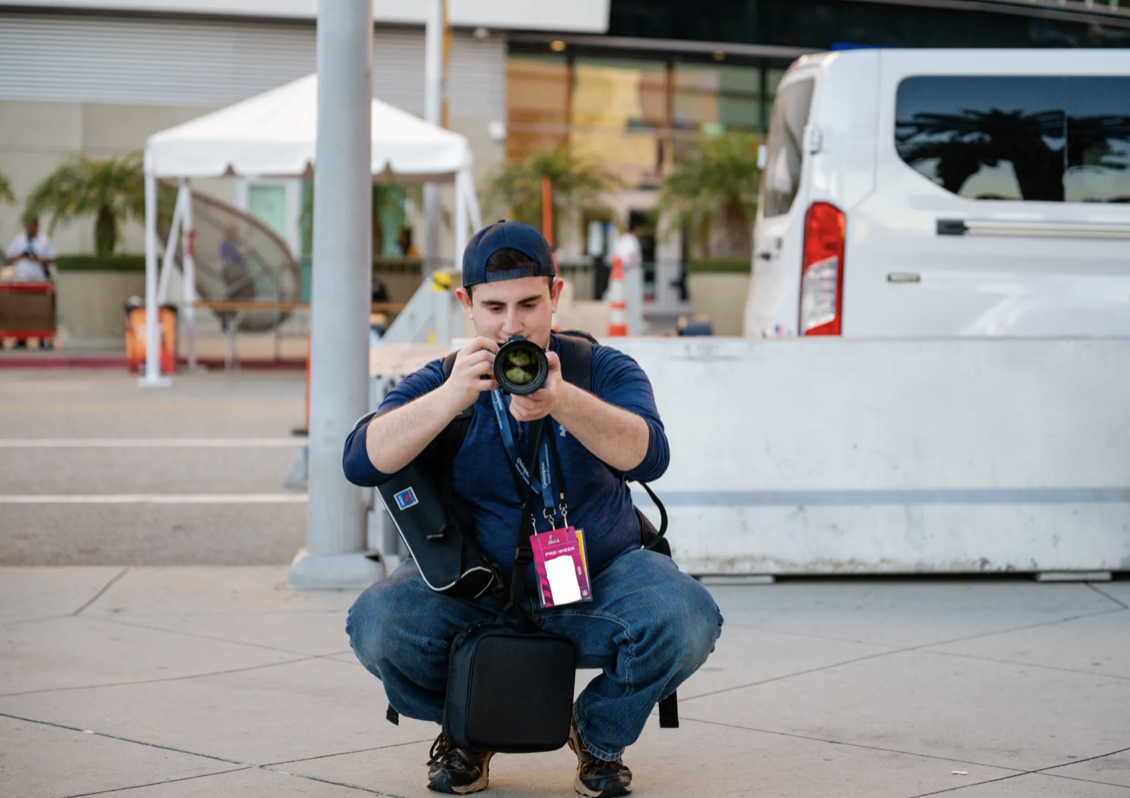
“It is definitely the opportunity of a lifetime,” said Roberts, a senior film, television and media arts major who works as the operations director for Ability Media and head engineer for Q30. “There was never even a thought that something like this could happen.”
For these Bobcats, it was a Super Bowl Week they won't soon forget.
“It ended up being the most amazing group of students working together,” Nicolakis said Sunday before the game. “We were so focused on getting our interviews, putting content together, and getting everything out as quickly and as organized as we could. We wanted to make sure it was top-tier quality.”
Stevens, Roush and others noticed the quality right away.
“We were so busy working we didn’t process that we were doing really good work until some of the industry professionals started telling us,” Nicolakis said. “And then we were like, ‘Wait a minute. We do know what we’re doing and we’re good at it.’ It’s just been such a great learning experience.”
The QU students covered Snoop Dogg’s Stars & Stripes Bowl, a flag football game between wounded veterans and NFL alumni, along with the Super Bowl Experience at the Los Angeles Convention Center, a Super Bowl party at Sony Pictures hosted by sports agent Leigh Steinberg and other events.
Nicolakis published a vibrant photo essay in Quinnipiac Today. Yarnell reported a compelling piece about the Miami Dolphins allegedly losing games on purpose. Handler connected with agents to arrange interviews. Maione and Blasi hosted three episodes of a Radio Row broadcast, “Coast to Coast Coverage.”
The Super Bowl credentials for this joint venture between Ability Media and Q30 were secured by Stevens, a 38-year veteran of broadcast journalism, including 20 years at ESPN.
“That’s probably my biggest coup — talking to the NFL and telling them about Ability Media and getting these students credentials,” said Stevens, who covered his 26th Super Bowl on Sunday and served as the group’s onsite mentor.
For many of the fans, VIPs and journalists in Los Angeles, last week marked their introduction to Ability Media. It also marked their introduction to Quinnipiac’s bold commitment to inclusive excellence.
Or, as Roush wrote in his January newsletter: “We know of no other communications program in the country who will have this large of a presence at the Super Bowl!”
See the team's Super Bowl Week coverage
In his LinkedIn profile, Roush makes a pledge to Quinnipiac: “I will be constantly looking for new and unique ways to improve the quality of our program with the help of the faculty, staff and students.”
Even during a pandemic.
Nearly two years ago, Roush and other thought leaders searched for a platform — a cause, really — that would draw national attention to the vision and vitality of the School of Communications.
“We really liked the idea of creating an organization that would create content around disability topics,” Roush said. “There seemed to be a real need there, a real opportunity for us to change the conversation.”
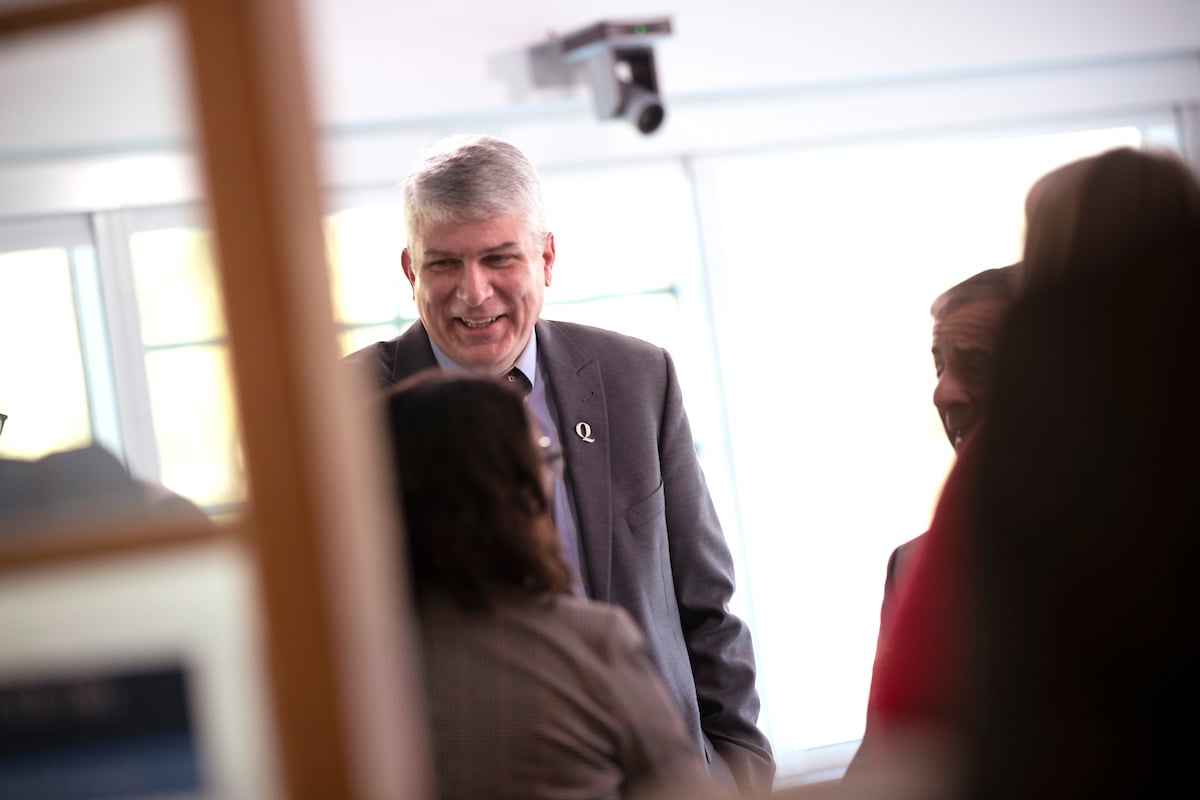
And so, Ability Media was born. Soon after, Roush hired Stevens to run the program and start recruiting students. But this was more than an ambitious pivot in strategy. In many ways, it was deeply personal.
Roush had changed the conversation before with his son, who has a learning disability. Together, they worked with school officials to develop an individualized education plan (IEP) to help him succeed in class.
Roush also changed the conversation in his previous role at the University of North Carolina in Chapel Hill. As the Walter E. Hussman Sr. Distinguished Professor in business journalism, he taught many students with learning disabilities.
One of those former students, Eric Garcia, came to Quinnipiac last fall to discuss his new book, “We’re Not Broken: Changing the Autism Conversation.” He even stayed at Roush’s house for the event.
Years earlier, Garcia had taken an economics reporting class with Roush. It was a memorable first day for both of them. Garcia walked up to Roush before class with his heart on his sleeve and his script in his head.
Roush still remembers Garcia’s introduction. In fact, he can just about recite it: “I want you to know that I'm autistic, and because I'm autistic, I tend to talk a lot in class and ramble. So, I just want you to feel free to tell me to shut up if I get to be too obnoxious.” Although Roush was initially taken aback by Garcia’s candor, he never told him to shut up that semester. Not once.
“Frankly, I forgot that he had told me that,” Roush grinned. “He was just like any other student to me. He was just delightful. Eric and I have remained close for the last 10 years. He’s even had Thanksgiving dinner at my house.”
After Garcia spoke at Quinnipiac, McGuire interviewed him about knowing when to share your disability — and how much to share.
“One question I asked for my own interest was how he went from being shy — just telling his professors about his autism but not his friends — to being an advocate and labeling himself an autistic journalist and writing a book,” McGuire said. “He said how you feel is like a spectrum. You know it changes every day. It really depends on who you’re with and what your community is like.”
Roush said he learns from Quinnipiac students every day. It’s the gift of a lifelong learner, a chance to connect with people from other cultures, disciplines, viewpoints, backgrounds and abilities.
“We have a student, Gabriela Alvares, who hates the word disability and refuses to use it. She uses the phrase ‘differently abled’ because she has a learning disability,” Roush said. “What Gabriela has shown me is that I need to be more attentive and careful about the words I use. There are a lot of things I’ve said in the past that I’m quite sure are offensive to people with disabilities because I wasn’t mentally aware it was offensive.”
Words will always matter, of course. Sometimes, they hurt deeply. Other times, they inspire in unprecedented and unimaginable ways. This was the case during a minor league baseball game years ago at Midway Stadium in St. Paul, Minnesota.
The official box score shows the St. Paul Saints lost to the Duluth-Superior Dukes, 9-6, on May 21, 1996. The right fielder for the Saints was Darryl Strawberry, the one-time slugger trying to make his way back to the big leagues.
The second baseman for the Saints, at least in the bottom of the ninth that night, was a former college football player named Dave Stevens.
Never mind that Stevens was born without legs, a tragic consequence of exposure to thalidomide, a drug given to pregnant women in the 1960s to relieve nausea.
Stevens wasn’t in St. Paul for pity. He was there to play.
There were other tryouts for Stevens: the cross-town Minnesota Twins and the Cincinnati Reds for baseball, even the Dallas Cowboys of the NFL. He never made the team, but he always made an impression.
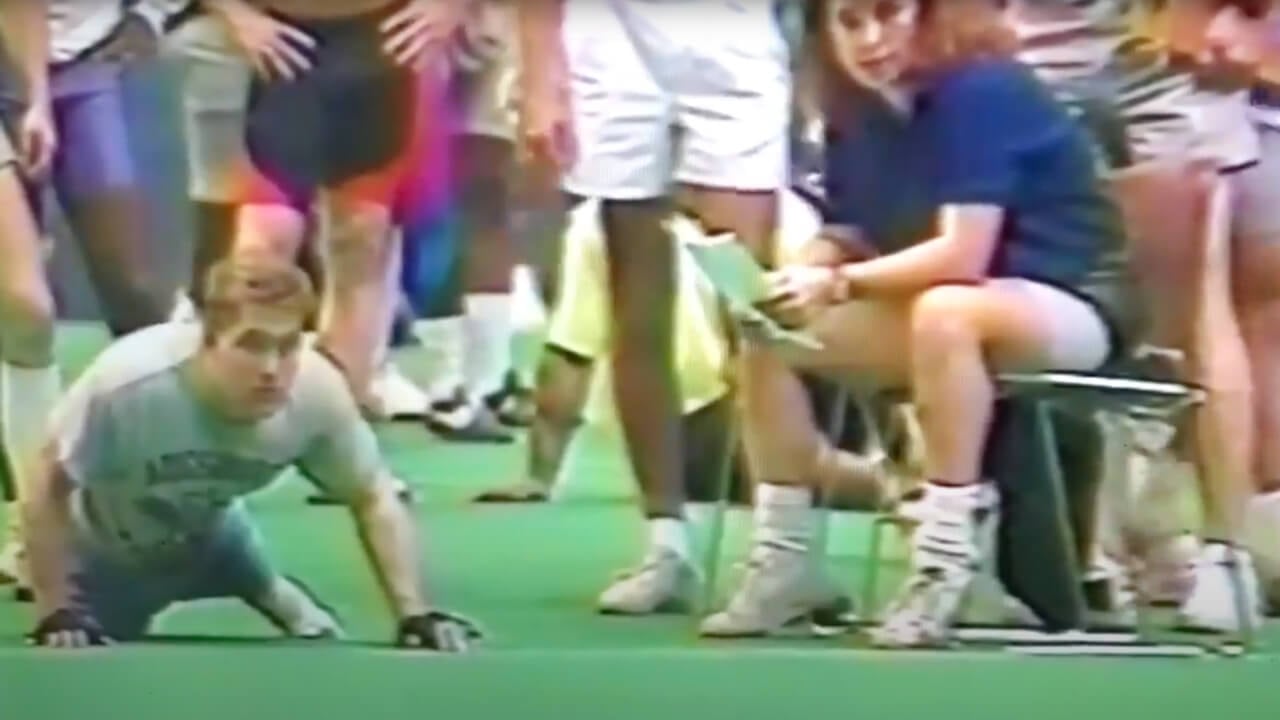
“I don’t sit around and daydream and wonder what it would be like to run,” said Stevens, who turned 56 a few weeks ago. “It’s better that I never had legs — unlike veterans and people who lost their limbs for whatever reason at different points in their lives.
“To be honest, I don’t know if I’d be the same person if I had legs. I don’t know what I’d be doing now. All I know is I’m doing what I love to do.”
In some ways, Stevens has become the face of Ability Media. He has a big personality with a broadcaster’s voice to match, whether he’s on campus with his skateboard or in the end zone reporting for The Disability Channel after a football game. Watch the first episode of Ability Media Now
Stevens works closely with Quinnipiac students to help them with their reporting and their reels. He pushes them to leave their comfort zones, whether it’s a live shot, a turn at hosting, or even, editing a package for the first time.
“I’m not just a teacher for the disabled. I believe I can teach those with disabilities and those without,” Stevens said. “I can teach students how to develop the skills they need for this business. I can teach them how to set up a cell phone for a video interview and make it look professional. That’s what we’re doing at Ability Media. Everyone is doing great work. I couldn't be happier.”
But it wasn’t always that way for Stevens. Shortly after he was born, he was put up for adoption right from the hospital. His birth mother never saw him. Eventually, Stevens was adopted by a World War II veteran and his wife. The couple struggled to make ends meet in the 1970s, but always found a way to love him to the moon and back.
As a boy, Stevens slept in a makeshift bedroom in Arizona where a refrigerator formed one wall and a bookcase formed the other. At school, recess was the worst part of the day for the kid nobody wanted on their team.
“Finally, I got tired of sitting all the time, so one day I just decided I was going to play and that’s what I did,” Stevens said. “I kept working at it and got better and better. I worked with my buddy in the backyard, and we played catch with a tennis ball and a Nerf football. Eventually, I got to the point where I wasn’t the last pick anymore.”
As far as Stevens is concerned, no one should ever have to worry about being the last pick. But sometimes, that’s not how life works.
“In the real world, you always have that elephant in the room, right? You never know how people are going to treat you,” Stevens said. “I took that bull by the horns and just ran with it. I’m hoping more and more students, both able-bodied and disabled, get involved with Ability Media because it’s a great mix of inclusion and diversity. Don’t judge me by my appearance. Judge me by my work.”
Will Dean, a junior journalism major in the 3+1 accelerated dual-degree program, knows how it feels to be pushed by Stevens. It starts with a wave of apprehension and uncertainty followed by a sweeping sense of accomplishment.
But that’s precisely why Dean joined Ability Media. He saw an opportunity to expand his skills, make new friends and grow as a journalist.
As host of The Friday Factor with Will Dean on WQAQ, the student-run campus radio station, he felt comfortable and confident. It was the same thing when he wrote the occasional story for The Quinnipiac Chronicle, and when he interviewed ESPN sports commentator Chris Berman recently during his visit to campus.
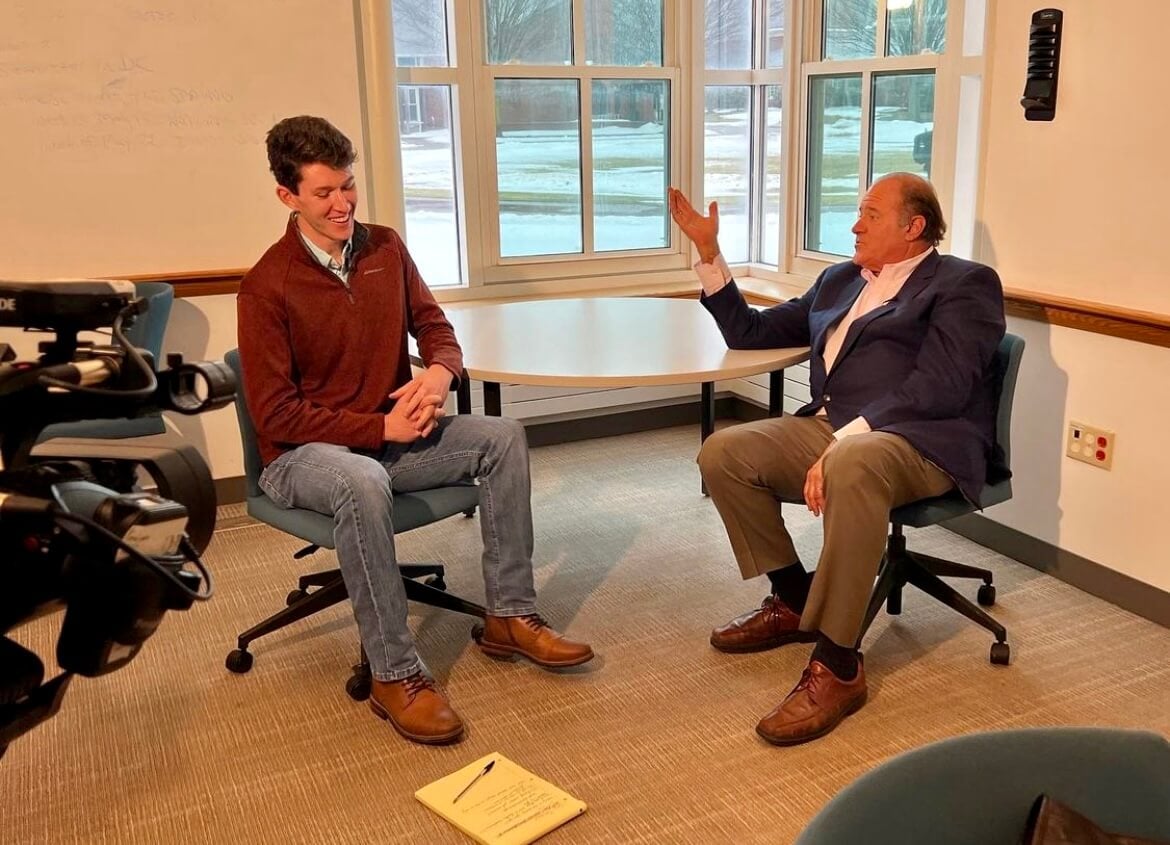
But shooting video, interviewing people on camera and editing a package was different. He needed time to become proficient. Or so he thought. Although Dean was one of the newest members of Ability Media last semester, Stevens pitched him a story right away.
Suddenly, Dean was part of a three-person crew assigned to cover the Runway of Dreams fashion show in New York last fall. The annual event, which is held during Fashion Week, features models with different abilities wearing clothes that are stylish, adaptive and exciting.
When the day came to drive to New York, the other two students couldn’t make it — and Dean became a one-person camera crew. So he did the only thing he could. He took a deep breath and grabbed the keys to the Ram 1500 pickup truck his grandpa gave him when he stopped driving.
“We’re talking a 2009 pickup with the 8-foot bed, and I’m trying to get to New York City by myself with all this gear for the shoot,” Dean said. “It’s hard enough to drive on the Merritt Parkway. Now, I have to do it on the West Side Highway, going past the Intrepid and everything, and trying to find parking on top of everything else?”
But that’s exactly what Dean did. And he nailed it — the parking, unloading all the gear, setting up his shots, interviewing the models, doing his standup on a balcony overlooking the city, he did it all.
As Dean recounts the events of that day, he speaks with a homespun cadence reminiscent of Jimmy Stewart in “It’s a Wonderful Life,” or maybe, “Mr. Smith Goes to Washington.” The humility is evident, just like his burgeoning talent.
“I'm carrying the camera attached to the tripod in one hand and the boom mic in the other hand, just running around trying to get my shots and do my interviews,” Dean recalled. “I really don’t know what else to call it but organized chaos. But it was wonderful getting to learn everything and to be a part of this new community with Ability Media.”
One of the models Dean spoke to that day was a young girl sitting in a wheelchair backstage playing with the buttons on her shirt. Her movements caught Dean’s attention right away.
“She kept doing it over and over,” Dean said. “Finally, I went over and asked her what she was doing? She explained the buttons were magnetic, so you didn’t have to fumble all around with them. They just opened and closed. It was amazing. It just made so much sense.”
For Stevens, who was honored as the Inspirational Man of the Year at the event, it was a perfect example of a student finding his way when the stakes were highest.
“He shot his own standup. He did the interviews. And the final product, it’s beautiful,” Stevens said. “Will can be very proud of the work he did. It gave him a different perspective of what it’s like to figure things out and find a way to get the job done.
“And, he did it in the biggest media market in the world covering Fashion Week. It’s important for the students to cover big events like this,” Stevens added. “That’s why I wanted to get them access to the Super Bowl and that environment. Ability Media is for every body.”
Almost two years after launching Ability Media, Roush and Stevens are pleased with the progress it has made and the lives it has changed. While that might sound hyperbolic, the outcomes say otherwise.
“For the students who do not have a learning disability or a physical disability who are working on Ability Media, they’ve gotten the same thing out of this — it’s made them more attuned with this vast community,” Roush said.
The next step is to expand the reach and capacity of Ability Media’s storytelling. Stevens envisions a media startup that will grow into a news magazine, perhaps a cross between “60 Minutes” and “CBS Sunday Morning” with a fiercely loyal audience.
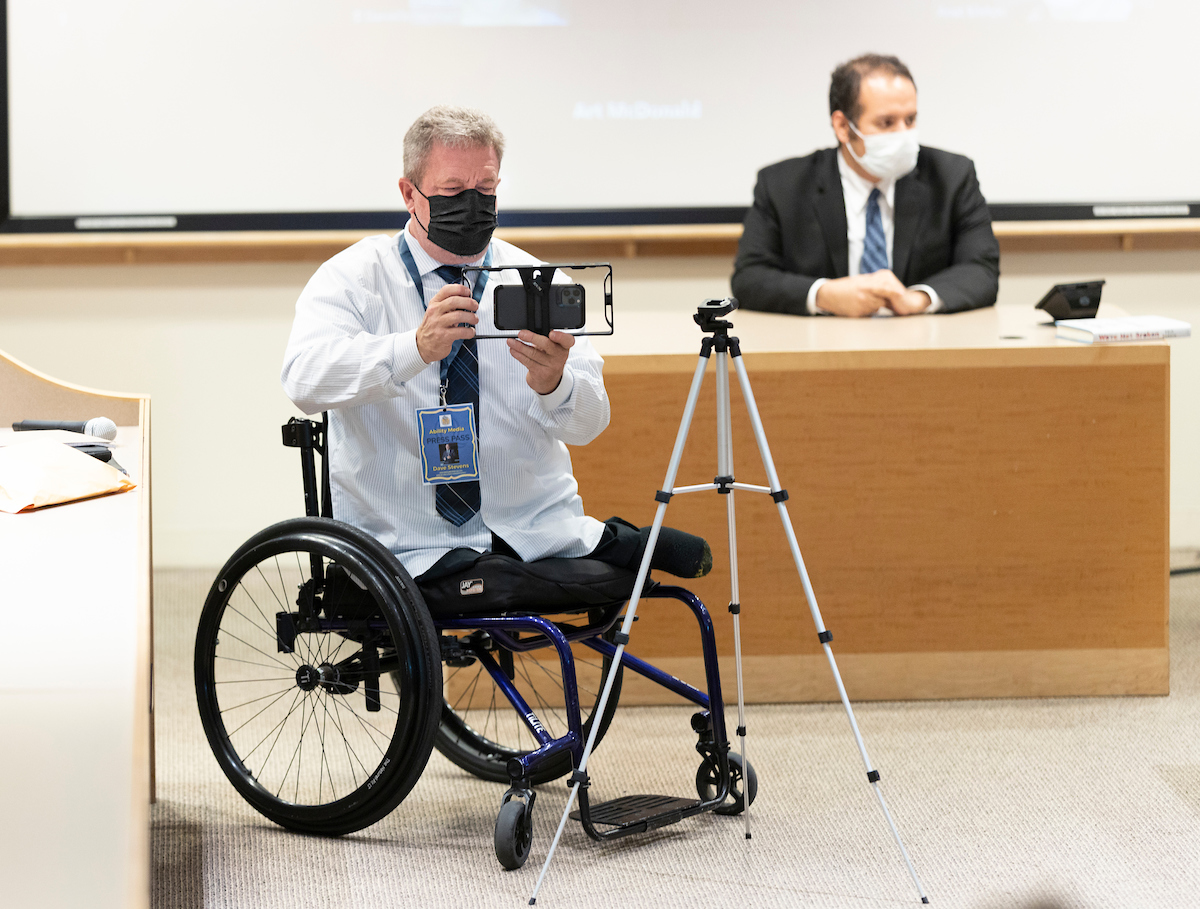
“I want this to be a news organization where we can break news, write our own content and produce it, promote our work on social media and our website, you name it,” Stevens said. “We want to do everything that other news organizations do — cover live stories, cover all the big events as credentialed media, drive important conversations, all of that.”
To achieve those goals, Ability Media needs two things: consistent funding and a consistent pipeline of talented students.
As a starting point, Ability Media recently launched a $2,000 crowdfunding campaign on Instagram, Facebook and Twitter. Quinnipiac also plans to offer its media production summer camp again for high school students, along with a robust summer camp lineup that includes the art of podcasting, sports journalism and introduction to photography.
Michael Guillen, a junior at Old Saybrook High School in Connecticut, attended the media production camp last summer. He enjoyed the lessons as much as the socialization.
“I control four cameras at school for the morning news, so the camp helped me learn new things and new ideas,” Guillen said. “Plus, I got to meet some genuinely great people. It was a fun two weeks. I learned a lot.”
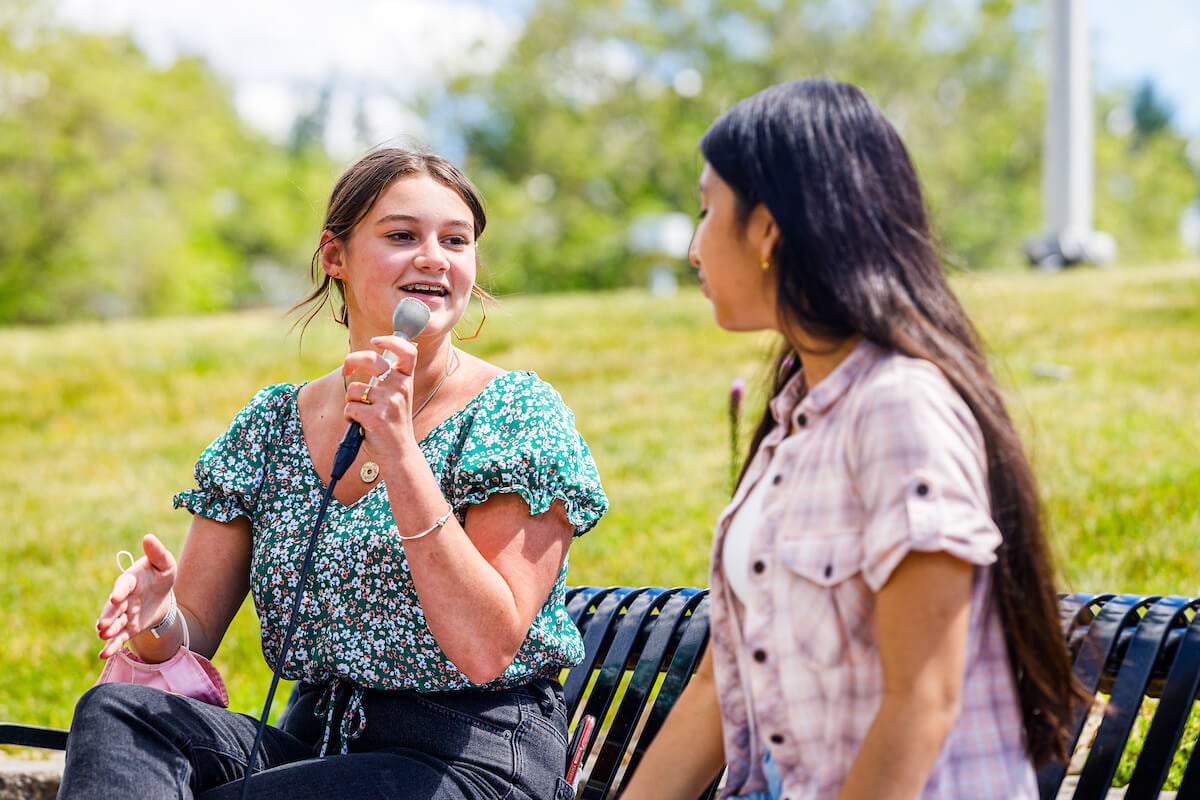
At the other end of the aisle, Roberts will soon become an alumnus of Quinnipiac as well as Ability Media. He’s proud to claim both legacies.
“Before this, I had never heard of a university or company focused on telling stories about people with different abilities and having people with different abilities tell those stories,” Roberts said. “I’m excited to be a part of Ability Media.”
After graduation, Roberts wants to be a director of photography and continue telling stories that make a difference. “I want to work with directors and people who have the same mindset that I do,” he said. “I want to tell authentic stories and really advocate for people.”
For Nicolakis, the most authentic story isn’t at the Super Bowl. Or her QU in LA semester this spring. Or even, her marketing internship with the Academy of Television Arts & Sciences.
Her most authentic story is back home in Woodbridge, Connecticut. For 17 years, her sister Kassiani has struggled with epilepsy and Russell-Silver Syndrome, a genetic disorder often associated with poor growth and other complications.
“I’ve grown up listening in on meetings and doctor’s appointments,” said Nicolakis, who was McGuire’s roommate last year. “But Kassi is the most smiley, upbeat person you’ll ever meet. She’ll gladly show you her Legos or her coloring books, whatever she’s working on.”
It’s from this lens that Nicolakis sees Ability Media as a calling. Despite her rigorous schedule as a sophomore graphic design and public relations double major in the 3+1 accelerated dual-degree program, and a deep commitment to campus activities and organizations, Nicolakis finds the time to serve as Ability Media’s public relations manager and graphic designer.
“It was really important to me that I was able to contribute to Ability Media,” Nicolakis said. “It’s a super-important initiative with a mission that’s obviously very close to my heart.”
With its mission and a compelling body of work now established, what’s next for Ability Media?
“For starters, we can share the hidden stories of Quinnipiac,” McGuire said. “There are lots of people here with disabilities that we haven’t talked to yet and shown what they can contribute.”
As much as these stories seek to build community and consensus, they’re also about shredding labels and stereotypes. McGuire is determined to be a leader in this movement, the journalist who uses truth, data and fact-based storytelling to effect change.
Her own story speaks to that commitment. As a little girl, leg braces were part of McGuire’s morning routine, the same as putting on her socks and sliding a spoon into her cereal.
“They became a visible marker of my disability. Everyone would ask me why I was wearing them,” McGuire said. “But at that point, I wasn’t in tune with why I was wearing them. I just knew the answer was, ‘Oh, they make me walk better.’ Unfortunately, that didn’t lead to any kind of discussion. I feel like now, I’m at a place where I can have that discussion.”
McGuire wore her braces all through elementary school and middle school. Finally, as she was preparing to enter high school, McGuire told her doctor she didn’t want to wear them anymore — and she never did.
“That was a big moment for me,” she said.
Since then, there have been plenty of big moments for McGuire. She holds important roles at Ability Media and Q30. She’s also studying abroad in Spain this semester.
But no matter where she is these days, it’s clear Grace McGuire is seen.
“Representation definitely matters,” McGuire said. “I feel like, if we don’t have the connections and the outreach, then the story stops there.”
Quinnipiac Today is your source for what's happening throughout #BobcatNation. Sign up for our weekly email newsletter to be among the first to know about news, events and members of our Bobcat family who are making a positive difference in our world.
Sign Up Now